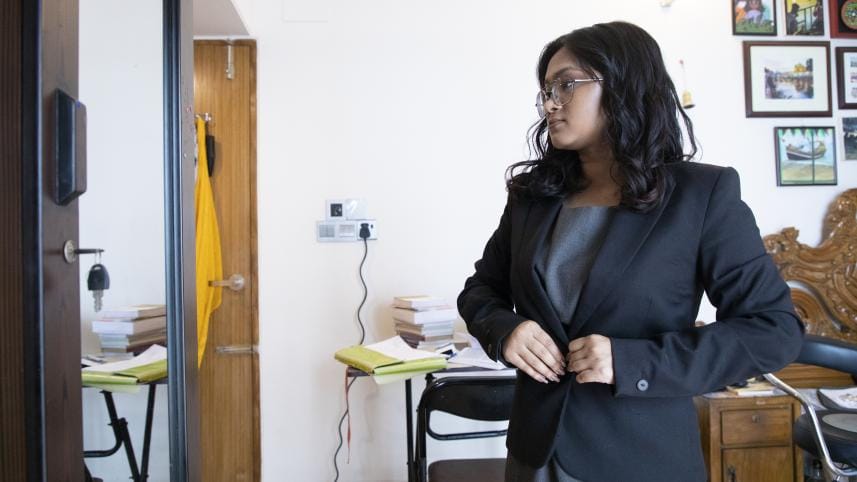The struggles women face entering their work lives

"Are you married?"
"No. Excuse me, but how is this question relevant?"
"There have been cases of teachers leaving their position because they got married and moved away. I need to know if you have already settled. I am sure you understand."
During my final job interview there, I had this conversation with the headmaster of a well-known English medium school and decided to say no. While I was privileged enough to risk saying no to a well-paid job, most women face these unwanted remarks day in and out, unable to leave their jobs. They bite their lips, brush it off, and go to work the next day.
On paper, it may appear that in today's professional environment, women have similar, if not the same, experience as men. The reality for young women entering the workforce however, looks somewhat different.
Women's appearance seems to be something everyone takes free reign to pass judgment on, completely disregarding professional decorum. You can't look too put together because you're just a silly girl obsessed with your appearance.
Tonima Rahman*, who started as newsroom editor for a well-known television channel in 2021, shares, "I had a female colleague who joined with me. She was good-looking, always well-dressed, and used makeup. Every time she made a mistake, this was always brought up. They mentioned it jokingly, saying she's more interested in doing her makeup and looking good than her work as if that somehow demeans her credibility as an employee."
On the flip side, you can't look too shabby, either. Especially in the corporate sector. Afsana Haque*, working as a junior officer at a financial institution, shares, "Corporate spheres are very critical of women. There's a lot of focus on external appearances. I get unwelcome comments regarding my lack of makeup or how I dress or do my hair. On the other hand, my male counterparts have come to work looking unkempt, and it's acceptable for them."

Regardless of which spectrum your looks belong to, if you are a woman, you will eventually get unwanted and uncomfortable glances from your male colleagues.
Ishrat Zahan Shuchi*, a lecturer at a private university, shares, "As a teacher who was a student just a few months ago, I often do not know how to deal with student-teacher problems. Most of my students are absolutely amazing. But then, some students would send suggestive messages to me on social media platforms or stare at my chest during classes. I am so dumbfounded I do not know what to do."
Ishrat continues, "I can brush it off for students, saying they are young and don't understand professionalism. But these are university students. Worse yet, university lecturers and far senior professors treat me like a woman first and a colleague second. For example, I once complained about not having a microphone in my class, and a senior faculty member said, 'You're a woman! Just pretend you're arguing with someone. Don't women talk loudly in general anyway?'"
The bar for women is set higher than for men in the professional field. So naturally, they are forced to overcompensate. Afsana continues, "People's expectations of me seem higher since I'm a woman. I must be polished, perfect, and knowledgeable, which is a lot to ask for someone who has just started. It's like I am not given enough time, and whenever I fail in any aspect, people are way harsher with me than I have seen them be with male colleagues."
A shift from the comfortable cocoon that is student life to work life comes with a realisation that you cannot make mistakes now, which can be overwhelming. When you are a woman entering the workforce, you learn that it's very much a man's world where you will be judged twice as hard for any mistake you make, making it even more overwhelming.
Sazia Khandaker*, working as a brand officer for a renowned multinational company, shares, "It took me six months to stop having panic attacks, learn my work, and adjust to the new environment and new expectations. I was lucky to have a manager who was very supportive and candid. But, unfortunately, I have seen that some women tend to become timid once faced with this adjustment period."
On top of the difficulties of navigating through the adjustment period, new recruits feel isolated in their workplace. Work-life can get very lonely with no one to talk to without having to calculate every word.

In specific male-dominated sectors, this isolation feels worse as the female employees feel like they're the odd ones out. Afsana explains such an experience saying, "Since I work in finance, it's very much a boy's club. Sometimes, I feel very bothered by male teammates who are more comfortable sharing knowledge amongst themselves. It feels isolating."
Social activities surrounding work are also organised in a way that often separates male and female employees. They don't get to socialise as much, so gendered bubbles are formed among the employees. Beyond the bubble, a different set of issues arises when women interact with their male co-workers. Anything goes, from unwanted personal questions to inappropriate jokes.
While the workplace culture is considered to be comparatively better at more prominent companies, more well-known organisations do have more inclusive policies at play. Company image plays a role in ensuring accountability, so more often than not, the guidelines are actually applied. However, this differs for lesser-known companies, and the phenomenon exists across job sectors.
Aroti Mukharjee* shares her experience of becoming a model in the Bangladeshi fashion scene,
"Unlike what most people believe, the higher-end fashion industry is very organised and gender-sensitive in my experience. I have worked for multiple brands and shows but faced no harassment or discrimination. This is not true for the lower end of this industry, though. Newcomers on this end often face unwanted remarks and questionable proposals that are borderline sexual harassment. When I was just starting off, I went for an interview, and the director asked me if I would show cleavage. He went as far as to place his hand on my chest. The director probably thought I would not say anything since I was new. I ended up filing a GD," she shared.
While there are too many instances of sexual harassment cases that remain unresolved, on a more positive note, a lot of smaller private companies are adopting a zero-tolerance for sexual harassment policy that they adhere to.
Zarina Tabassum*, who has recently started working as a Junior Software Engineer at a Private IT Firm, shares, "When I first joined, we were told that this company is very strict about their sexual harassment policy. There is only one reason for which an employee has been let go: a female employee placed a complaint. Not going to lie, it felt reassuring to hear that."

What policies cannot fix, however, is people's mentality. Despite the policies to ensure gender sensitivity, the culture in most workplaces remains patriarchal.
Anika Mehzabin Rifa*, an assistant manager at a well-known think tank, shares, "I was once threatened with an unfair demotion by an HR personnel at my office. When I asked for an explanation, he couldn't give one. So I ended up going to someone higher up for clarification. When the HR person was questioned regarding this, he denied the whole incident, making light of the situation, saying women always make a big deal out of nothing."
The problems with numbers are they often don't count what they cannot see. So, on the one hand, we have workplaces claiming zero percent gender disparity. But, on the other hand, problems plaguing young women in their professional lives are being dismissed as overreactions.
*Names have been changed upon request.
Tazreen is waiting for the day when women feel safe enough to name names when they tell their stories. Find her at tazreenzahan@gmail.com



 For all latest news, follow The Daily Star's Google News channel.
For all latest news, follow The Daily Star's Google News channel. 



Comments